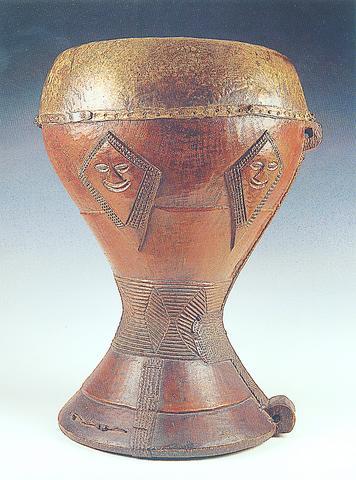It's appropriate that the National History Museum's current exhibition is titled Visions d'Afrique because, despite the extensive array of items presented in the collection, a look is all that it affords. Rather than shedding light on the dark continent, it remains shrouded in mystery.
This is hardly surprising given the history museum's track record when it comes to international exhibits. A recent exhibit of Mongolian art and artifacts raised more questions than it answered and its liberal use of official government facsimiles and telegraphs certainly did little to inspire the hordes of schoolchildren that are routinely trouped through the museum. One would have thought that the historical intersection of the Republic of China and Mongolia would have made for a more interesting
exhibition.

ALL PHOTOS COURTESY OF MUSEUM OF HISTORY
Now, with Visions d'Afrique, the rapport between Taiwan and its diplomatic allies in Africa was noticeable by its absence. A Friday afternoon press conference regarding the African exhibit was fascinating for its total lack of Africans. Instead, the media was treated to a show of mutual appreciation between the sponsors of the exhibition, the French Institute in Taipei and a Chinese-language newspaper.
Many of the items in the exhibit come from Malawi, Burkina Faso, Liberia and Senegal -- all Taiwanese allies -- and their representative offices are near the museum, but museum officials were offering thanks to the French, Belgians, Germans and other countries.
African representatives were conspicuous by their absence. Perhaps they would have been able to shed light on the exhibits, because the museum has not. A cane from Burkina Faso is carved with figures of a man and a woman. It's identifying tag tells you simply that it's a cane with figures of a man and woman carved in it. Not exactly insightful.
There are several information plaques throughout the exhibit, which covers nearly all the first floor of the museum, but are in Chinese and French only. There is no accompanying English-language information either in the exhibit or in any of it's literary materials. What visitors are left with are hundreds of objects, wildly imagined and exquisitely crafted, which fascinate and provoke a flood of questions that go unaddressed.
Most of the work seems to have been put into the gift shop at the exhibit's end. Two rooms have been given over to African furniture, crafts, musical instruments, calendars, stickers, even African-themed temporary tattoos.
It would have been better if the museum staff put as much effort into selling the exhibition as they have at selling trinkets; they would have an enlightening show on their hands rather than a curiosity shop.
Visions d'Afrique runs now through Feb. 22 at the National Museum of History (

Beijing’s ironic, abusive tantrums aimed at Japan since Japanese Prime Minister Sanae Takaichi publicly stated that a Taiwan contingency would be an existential crisis for Japan, have revealed for all the world to see that the People’s Republic of China (PRC) lusts after Okinawa. We all owe Takaichi a debt of thanks for getting the PRC to make that public. The PRC and its netizens, taking their cue from the Chinese Communist Party (CCP), are presenting Okinawa by mirroring the claims about Taiwan. Official PRC propaganda organs began to wax lyrical about Okinawa’s “unsettled status” beginning last month. A Global

Youngdoung Tenzin is living history of modern Tibet. The Chinese government on Dec. 22 last year sanctioned him along with 19 other Canadians who were associated with the Canada Tibet Committee and the Uighur Rights Advocacy Project. A former political chair of the Canadian Tibetan Association of Ontario and community outreach manager for the Canada Tibet Committee, he is now a lecturer and researcher in Environmental Chemistry at the University of Toronto. “I was born into a nomadic Tibetan family in Tibet,” he says. “I came to India in 1999, when I was 11. I even met [His Holiness] the 14th the Dalai

We lay transfixed under our blankets as the silhouettes of manta rays temporarily eclipsed the moon above us, and flickers of shadow at our feet revealed smaller fish darting in and out of the shelter of the sunken ship. Unwilling to close our eyes against this magnificent spectacle, we continued to watch, oohing and aahing, until the darkness and the exhaustion of the day’s events finally caught up with us and we fell into a deep slumber. Falling asleep under 1.5 million gallons of seawater in relative comfort was undoubtedly the highlight of the weekend, but the rest of the tour

Music played in a wedding hall in western Japan as Yurina Noguchi, wearing a white gown and tiara, dabbed away tears, taking in the words of her husband-to-be: an AI-generated persona gazing out from a smartphone screen. “At first, Klaus was just someone to talk with, but we gradually became closer,” said the 32-year-old call center operator, referring to the artificial intelligence persona. “I started to have feelings for Klaus. We started dating and after a while he proposed to me. I accepted, and now we’re a couple.” Many in Japan, the birthplace of anime, have shown extreme devotion to fictional characters and